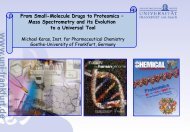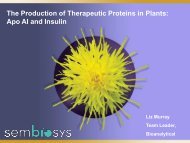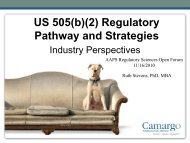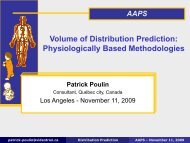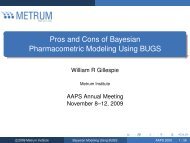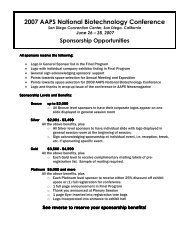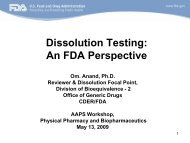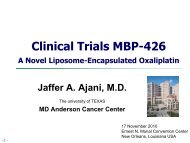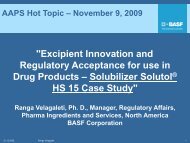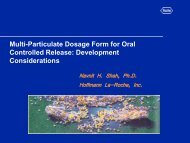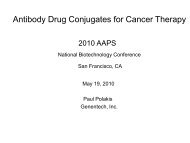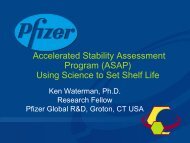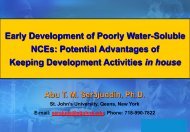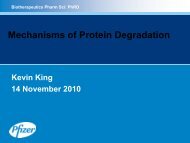Preliminary Program - American Association of Pharmaceutical ...
Preliminary Program - American Association of Pharmaceutical ...
Preliminary Program - American Association of Pharmaceutical ...
You also want an ePaper? Increase the reach of your titles
YUMPU automatically turns print PDFs into web optimized ePapers that Google loves.
47<br />
2009 AAPS Annual Meeting and Exposition<br />
AAPS Drug Design and Discovery (DDD) <strong>Program</strong>ming<br />
New INTERACTIVE FEATURE for all Roundtable Sessions!<br />
Click on roundtable moderator names to submit questions that you would like to be addressed at the roundtable session in Los Angeles.<br />
Sunday, November 8, 2009<br />
8:30 am – 4:00 pm<br />
Learning the Drug Discovery and<br />
Delivery Interface Process<br />
Short Course #2<br />
An additional fee is required to attend this short course<br />
The main goal <strong>of</strong> this Short Course is to provide<br />
scientists with an overview <strong>of</strong> the multidisciplinary<br />
concepts that underpin the drug discovery and<br />
delivery interface (D3I) for small molecules. This will<br />
be accomplished using traditional teaching modules<br />
followed by application <strong>of</strong> these concepts via group<br />
participation in a game format. This short course will<br />
be divided into two parts. In the morning, facilitators<br />
will provide an introduction to the basic concepts<br />
<strong>of</strong> hit identification, lead optimization, and clinical<br />
development. This will be accomplished using<br />
prepared course materials. This introduction will<br />
be followed by a detailed overview <strong>of</strong> the structureactivity<br />
relationships (SAR) that are necessary for a<br />
new molecular entity to have pharmacologic activity<br />
in a human disease state, and the structure-property<br />
relationships (SPR) that are necessary to enable<br />
delivery <strong>of</strong> the drug to patients. This session will be<br />
concluded by a review <strong>of</strong> the expected attributes<br />
<strong>of</strong> a successful clinical candidate. The afternoon<br />
session will reinforce these concepts through group<br />
participation in a D3I game. Participants will be<br />
assigned to groups consisting <strong>of</strong> representatives<br />
<strong>of</strong> the various disciplines responsible for drug<br />
discovery and drug delivery (e.g., medicinal chemist,<br />
biologist, ADME scientist, toxicologist, process<br />
chemist, formulator, etc.). Each team will be given<br />
identical product pr<strong>of</strong>iles, a timeline, and a budget;<br />
there will be 2 to 3 rounds in the game. In each<br />
round, the teams will be expected to work together<br />
to create a plan within timeline and budget for<br />
their molecule. Challenges in the game will come<br />
from unexpected obstacles which <strong>of</strong>ten appear<br />
when least expected in drug discovery. To this<br />
end, the teams will receive a Gotcha Card and then<br />
asked to adjust their plan in response to this new<br />
information. At the end <strong>of</strong> the round, the teams will<br />
present their proposal and explain how they arrived<br />
at their solution. They will be given a score based on<br />
their solutions and whether they were able to deliver<br />
the plan within the allotted timeline, and budget.<br />
The teams will also be asked to compare notes for<br />
each Product Pr<strong>of</strong>ile since it is likely that each team<br />
will arrive at a different solution depending on the<br />
experience level <strong>of</strong> the participants on the team. It<br />
is also expected that the course facilitators will use<br />
this game format to help the participants learn more<br />
about the significant challenges and stark realities<br />
<strong>of</strong> contemporary drug discovery.<br />
Moderators<br />
Jeffrey Silverman, Ph.D.<br />
Consultant<br />
Debra Luffer-Atlas, Ph.D.<br />
Eli Lilly and Company<br />
Monday, November 9, 2009<br />
MONDAY AFTERNOON ROUNDTABLES<br />
2:00 pm – 4:00 pm<br />
Navigating the New Rules Regarding<br />
Patent Law: Decodifying ‘Obviousness’,<br />
‘Limited Claims’, and How it Affects New<br />
Composition <strong>of</strong> Matter Patents<br />
Roundtable<br />
There have been continuous changes implemented<br />
by the US PTO to streamline the patent filing and<br />
approval process, and reduce patent prosecution<br />
times. With it have come several changes to the<br />
content <strong>of</strong> patents and continuation filings, which<br />
significantly impact/limit patenting chemical,<br />
pharmaceutical and biotech inventions. For<br />
example, U.S. and international law denies<br />
patentability to subject matter which is “obvious”<br />
or which lacks an “inventive step”. However,<br />
such rulings differ from country to country. This<br />
roundtable will invite discussion from patent law<br />
experts regarding these recent developments,<br />
such as what counts as “obvious” in the context <strong>of</strong><br />
chemical, pharmaceutical, and biotechnological<br />
inventions, limits on claims and continuation<br />
applications.<br />
Moderators<br />
Michael Bornstein, Ph.D.<br />
Bornstein Consulting, LLC<br />
Jeffrey A. Lindeman, Ph.D.<br />
O’Brien Jones PLLC<br />
New Regulations in Patent Law for the Pharma<br />
Industry<br />
Scott Bornstein, J.D.<br />
Greenberg Traurig, LLP<br />
Presentation Title to Be Determined<br />
Barry Schindler, J.D.<br />
Greenberg Traurig, LLP<br />
A Look at Post-KSR Cases: Is the Perceived<br />
Change Really that Great?<br />
Irem (Remy) Yucel, Ph.D.<br />
U.S. Patent and Trademark Office<br />
JOINT MEMBERSHIP MEETING AND<br />
RECEPTION<br />
5:30 pm – 7:00 pm<br />
Drug Design and Discovery (DDD)<br />
Section Joint Membership Meeting<br />
and Reception<br />
Tuesday, November 10, 2009<br />
TUESDAY SUNRISE SESSIONS<br />
7:00 am – 8:15 am<br />
The Blood Brain Barrier<br />
Sunrise Session<br />
Pharmacokinetic assessment in early drug discovery<br />
is now a commonly accepted approach to increase<br />
the chances <strong>of</strong> identifying candidates with suitable<br />
properties for further development. For CNS<br />
therapeutics, there is the additional requirement<br />
<strong>of</strong> blood brain barrier (BBB) penetration and brain<br />
localization. Several tools, both old and new, are<br />
being applied to guide drug design and medicinal<br />
chemistry to increase brain penetration. This<br />
sunrise session will contain presentations about<br />
in silico prediction tools for BBB, discuss in vitro<br />
models <strong>of</strong> the BBB, and present a case study <strong>of</strong> BBB<br />
enhancements in drug discovery.<br />
Moderator<br />
Nurulain Zaveri, Ph.D.<br />
Molecular Medicine Research Institute<br />
Key Principles for Optimization <strong>of</strong> CNStargeted<br />
Therapeutics<br />
Stephen Hitchcock, Ph.D.<br />
Amgen Inc.<br />
Opioids, Pgp, and the Blood-Brain Barrier<br />
Andrew Coop, Ph.D.<br />
University <strong>of</strong> Maryland School <strong>of</strong> Pharmacy<br />
Graduate Student Symposium<br />
8:30 am – 11:00 am<br />
AAPS Graduate Student Symposium<br />
in Drug Design and Discovery (DDD)<br />
Sponsored by



